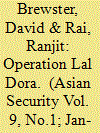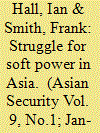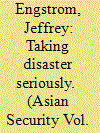| Srl | Item |
| 1 |
ID:
119115


|
|
|
|
|
| Publication |
2013.
|
| Summary/Abstract |
As India expands its strategic reach in the Indian Ocean, it will need friends that it can count on. The island state of Mauritius has long been one of India's closest allies in the region. This article discusses India's plans for a military intervention in Mauritius in 1983 to prevent a feared coup that may have threatened India's interests. A naval task force was readied, but the intervention did not proceed because of disagreements in India's leadership. Instead New Delhi facilitated a political solution to the crisis that firmly consolidated its special role. This previously undisclosed episode sheds light on India's thinking about the Indian Ocean, the alignment of India's interests with the United States, and India's military capabilities.
|
|
|
|
|
|
|
|
|
|
|
|
|
|
|
|
| 2 |
ID:
119112


|
|
|
|
|
| Publication |
2013.
|
| Summary/Abstract |
Throughout Asia, states are competing to build and leverage soft power using public diplomacy. This article examines these investments, whether they pay dividends, and why they are being made. A mix of qualitative and quantitative analysis shows little, if any, positive correlation between public diplomacy by Asian states and foreign public opinion. We therefore ask why states invest in public diplomacy when it does not seem to work. We argue that different motives are at play: The struggle for soft power is driven by both a logic of consequences and logic of appropriateness. Lastly, we suggest how this struggle might aggravate rather than ameliorate tensions in the region.
|
|
|
|
|
|
|
|
|
|
|
|
|
|
|
|
| 3 |
ID:
119114


|
|
|
|
|
| Publication |
2013.
|
| Summary/Abstract |
The participation of East Asian militaries (Japan, China, Taiwan, and South Korea) in international disaster relief is a relatively new phenomenon having many implications that will shape the global landscape of the 21st century. This article looks at the historical record of these operations and notes how they have evolved in size and scope over time. Empirical data are presented and analyzed to identify and compare demonstrated capacities for force projection. These demonstrated capacities are considered with current and future capabilities to contemplate the trajectory of the militaries' future participation in disaster relief and ability for force projection. Finally, the article concludes with a brief assessment of implications and policy considerations.
|
|
|
|
|
|
|
|
|
|
|
|
|
|
|
|
| 4 |
ID:
119113


|
|
|
|
|
| Publication |
2013.
|
| Summary/Abstract |
The US military response to the 2004 Indian Ocean tsunami had a powerful strategic influence on Indonesia, and led the US Navy to make far-reaching changes in its strategic approach to humanitarian assistance/disaster relief (HA/DR) operations. These changes emerged because the positive benefits of military-delivered relief were so clearly demonstrated and the experiences validated specific concepts that have since guided the US Navy toward becoming a humanitarian partner. Current force structures were demonstrated to be adaptable to HA/DR, close cooperation with diverse partners was affirmed as a key element of successful maritime operations, and seabasing was shown as an operational construct exceptionally well suited for HA/DR. As a result of the changes, the naval response to the tsunami that struck Japan in 2011 took place in a very different strategic context.
|
|
|
|
|
|
|
|
|
|
|
|
|
|
|
|